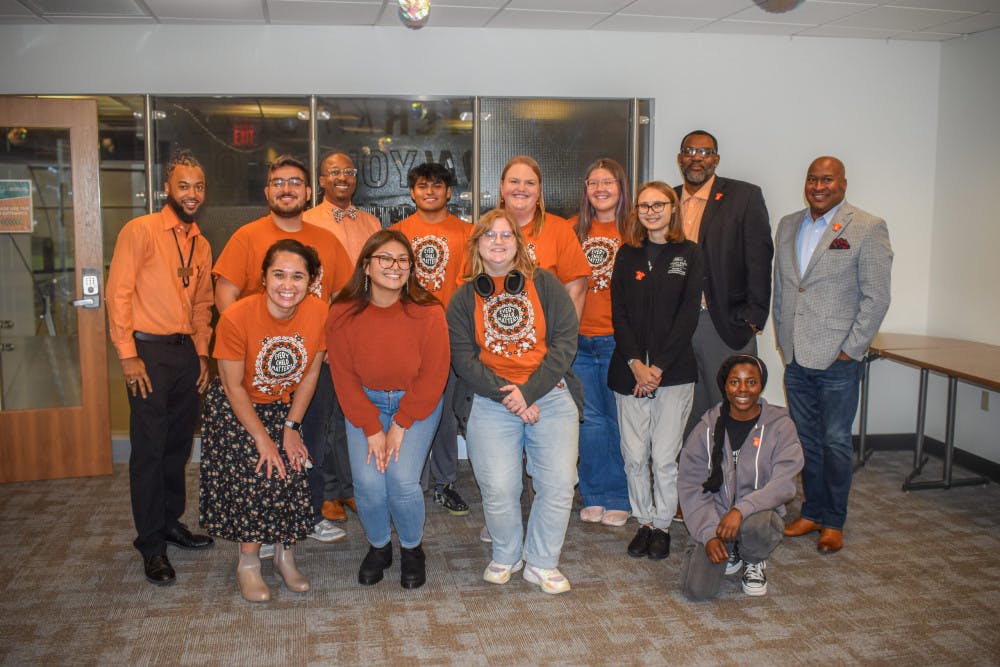Orange Shirt Day | Photos by Alex Roberts | The Wright State Guardian
On Monday, Sept. 30, the Indigenous American Culture Student Association hosted an event to celebrate Orange Shirt Day, a yearly event that serves to honor the victims of Canada’s residential schools.
Orange Shirt Day
“National Day of Truth and Reconciliation – or Orange Shirt Day – is a day of remembrance commemorating the history of the Indigenous boarding schools and their legacies in North America. It is a federal holiday in Canada, but widely recognized by Native Nations located within the United States as well,” IACSA’s event page reads.
Orange Shirt Day is to bring awareness to and commemorate the victims of Canada’s residential schools– but what exactly were residential schools?
What were residential schools?
An article written by Eric Hanson with edits by Daniel P. Gamez and Alexa Manuel goes into detail on what residential schools were, how they originated and the harsh conditions under which Indigenous students lived.
The residential school system, “...[severed] the ties through which Indigenous culture is taught and sustained, and [contributed] to a general loss of language and culture. The devastating effects of the residential schools are far-reaching and continue to have a significant impact on Indigenous communities,” the article states.
Residential schools started as an initiative by the Canadian government to educate Indigenous students. The main purpose, however, was to indoctrinate them to Christian and “Western” ways of living. Part of the indoctrination process was to forbid students from embracing their Indigenous heritage and language.
Harsh punishments were given out to those who did not subscribe to the Christian ways residential schools taught.
“Former students of residential schools have spoken of horrendous abuse at the hands of residential school staff: physical, sexual, emotional, and psychological,” the article states.
Residential schools were in operation from the 1800s to the late 1990s. While the Canadian government and the churches involved have since issued formal apologies for the damages done to Indigenous culture, it is not enough to reverse it.
Indigenous people continue to commemorate this event by celebrating each year and spreading awareness of past and present ongoing situations.
How did Orange Shirt Day start?
The orange shirt that started the event originates from a story told by residential school victim Phyllis Webstad, who is Northern Secwepemc (Shuswap) from the Stswecem’c Xgat’tem First Nation.
According to the Native American Student Association at Iowa University, “At the age of 6, [Webstad] attended her first day at the St. Joseph Mission Residential School. Upon arrival, she was stripped of all her clothes, including her orange shirt that [had] been gifted to her by her grandmother.”
This story is one of many that showcase the abuse Indigenous students suffered at the hand of the residential school workers.
Once the schools were shut down, victims of St. Joseph Mission Residential School held a reunion and series of events to witness and honor the healing journey of the survivors and the survivors’ families, according to the Orange Shirt Society.
Orange Shirt Day exists as a legacy to that reunion,
“The date was chosen because it is the time of year in which children were taken from their homes to residential schools, and because it is an opportunity to set the stage for anti-racism and anti-bullying policies for the coming school year,” Orange Shirt Society states.
In the words of Webstad, “[Orange Shirt Day] is a day to honor and remember Residential School survivors and their families. Every Child Matters even if you’re an adult. We must also remember those children that never made it and are no longer with us. Today is a day for survivors to tell their stories and for us to listen with open hearts.”
IACSA’s event
The event started as a group photo for students wearing orange shirts. Afterwards, attendees were invited to take a trip to the Dayton Metro Library to do volunteer work.
Volunteers participated in an Orange Shirt Day children’s reading hour.
The club also held tabling events to sell orange shirts and pins throughout September; the money raised during the events benefited the Native Student Scholarship Fund.
IACSA has plenty of events planned for the future that revolve around both engagement and spreading awareness.
Those interested in IACSA can join the club on Engage. Their next event is a forest hike at 11a.m. on Oct. 12.









